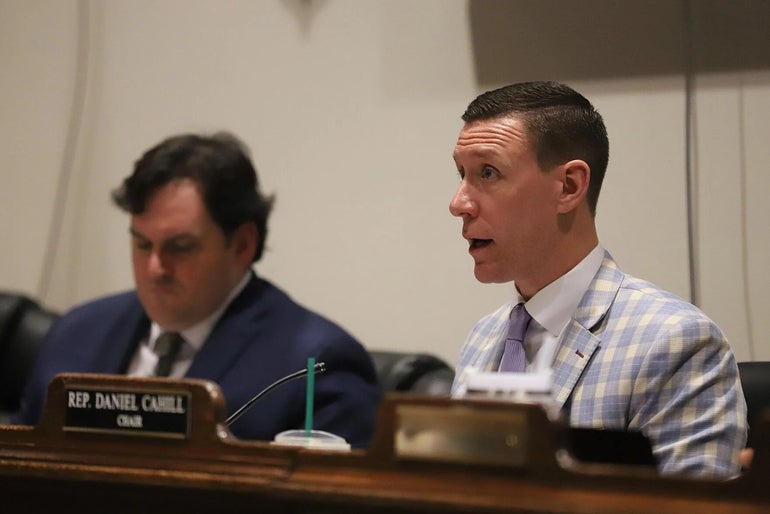Bills aimed at cracking down on escalating assaults on health care workers have languished in the Legislature for 16 years. This session, an unexpected coalition hopes a new compromise will break through.
The Massachusetts Nurses Association, Massachusetts Health & Hospital Association, and Massachusetts division of 1199 SEIU United Healthcare Workers East have often been at odds on health care workforce issues, and MHA and MNA in previous sessions have pushed separate proposals related to violence in hospitals.
The bill they came together on this session (H 2655 / S 1718) would stiffen penalties for employers who don’t comply with requirements, increase the charge for intentional assault and battery against health care workers from a misdemeanor to a felony, allow assaulted health care workers to take paid sick leave to handle legal issues, and not require them to use sick time or vacation time if injured from violence on the job.
“This panel is not one you will see often, but the issue demands it,” said Julie Pinkham, executive director of the MNA, sitting next to representatives from MHA and 1199 SEIU during a Committee on Public Safety and Homeland Security hearing on Wednesday.
Health care workers are facing increasingly dangerous and violent situations in hospitals, the three health care organizations all testified. In the 16 years since a version of this bill was first introduced, incidents of assault on workers have grown significantly.
“What happens every 36 minutes in a Massachusetts hospital?” said MHA President and CEO Steve Walsh. “It isn’t a lifesaving procedure. It isn’t the beginning of a new career. It isn’t a lifesaving technology or therapy. It’s the assault of one of our workers every 36 minutes.”
The bill requires reports on workplace violence to be submitted every 180 days to the hospital’s regional district attorney office. It also stipulates that if an employee requires leave because of workplace violence, it will be paid and they can face no retaliation. The bill allows health care employees to take seven days leave in any 12-month period following a violent incident.
One section of the bill focuses on increasing the punishment for patients who assault health care workers.
A person who intentionally commits assault and battery on an employee during working hours could face up to five years of prison time.
Sen. John Cronin, the Senate co-chair of the committee, asked the panel about concerns of unintended consequences.
“A potential negative unintended consequence of previous versions of this legislation is that there was a risk, or a risk potentially identified, to further criminalize mental illness and to criminalize people in our hospitals who are in a mental health crisis, which unfortunately, is also happening every hour of every day in our commonwealth,” Cronin said.
Walsh and Pinkham replied that they crafted the legislation with that issue at the forefront of their minds.
“We’re very clear that a person that is in the middle of a behavioral diagnosis cannot formulate the intent necessary to commit a crime. It doesn’t change the fact that the worker, though, has been harmed,” Walsh said. “So we tried to bifurcate the two, protected the patient or the visitor that might be undergoing an episode that cannot formulate intent to be punished under the law, but also give the worker that still has been harmed the opportunity to get care for that harm.”
Cronin then pointed out that the bill says a person would have to “knowingly and intentionally” commit assault and battery to face the higher penalty charges. He said the language “is really clear, and demonstrates that appropriate balance.”
A number of lawmakers on the panel expressed their strong support for the bill. Reps. Rodney Elliott, Chris Worrell and Steven Xiarhos all said they have nurses in their immediate family, and shared anecdotes about times they experienced violence on the job.
Worrell said his wife, who is a nurse, had to return to work the day after experiencing a violent incident and continue to care for the patient who had assaulted her.
“I just want to say thank you for the bill. Like my colleague down there said, I’m in full support,” Worrell said.
Advocates testifying in favor, however, pointed out that the committee last session favorably reported a similar bill, but it still died without reaching the floor of either chamber.
Dr. Joseph Kopp, an emergency medicine physician at Faulkner and Brigham and Women’s hospitals, said he had testified before the committee two years ago, sharing his experiences of being punched in the chest and having a metal chair thrown at his head.
“But what stood out to me two years ago was a testimony from a nurse who said she had been speaking to advance protections for health care workers for more than 10 years, and that broke my heart,” Kopp said. “There was great support from the committee, and there always is.”
He asked members of the committee to not just favorably advance the bill, but to advocate for it behind closed doors with legislative leaders to get it to a vote on the floor.
“When those discussions are happening after a committee, they can’t look in that nurse’s eyes as they make the decision on whether or not this is the time to get this done. Please, I’m asking for you to be our champions,” he said.

